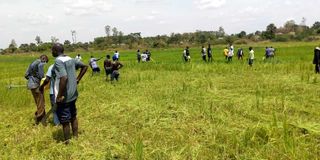Enforcement of wetland laws should be considerate

People cut down rice planted in Okole wetland in Lira District in February. Last week, 30 acres of rice were slashed down in Otuke District. PHOTO | CHARITY AKULLO
What you need to know:
- The issue: Environment laws
- Our view: A decision such as the one taken in Kwania should have involved all the stakeholders, especially the farmers and enforced after an agreement with them.
Kwania Deputy Resident District Commissioner (RDC) last week opened a war against wetland encroachment, targeting mainly rice growers.
In statements reported in the media, the deputy RDC said wetland cover in the district was alarmingly depleted.
The comments followed the mowing down of acres of rice plantations in wetlands in what now appears to have been enforced without the knowledge of the environment watchdog, National Environment Management Authority (Nema).
In a country where environment laws are shamelessly flouted, it is encouraging to see a leader take responsibility. The call, in line with a July 2021 Cabinet decision banning growing of rice in wetlands, should be seen in more areas across the country. However, the execution of the good cause is equally important.
As a newspaper that stands to promote efforts to protect the environment, we applaud the decision and challenge other local leaders and stakeholders in environmental protection to make deliberate efforts before it is too late.
These efforts should not stop at mowing down rice farms in wetlands but cover the major culprits such as buildings in towns too.
The wetland coverage in Uganda has been gravely depleted over the last few years yet these water catchment areas are very significant against flooding, filtering waste water before they reach fresh water bodies as well as acting as habitats for aquatic life.
The total disregard of the crucial role of wetlands as seen in lack of sustainable management practices is one of the major reasons for flooding in major towns.
However, we are appalled by the manner with which the law was enforced. In a country fighting to avoid sinking into food insecurity, it is shocking that a leader would take such a drastic measure without considering other factors.
A decision such as the one taken in Kwania should have involved all the stakeholders, especially the farmers and enforced after an agreement with them.
Razing down already grown rice was a very unfortunate undertaking when the easier alternative of allowing the produce to mature and be harvested before a ban is enforced would have served the purpose.
Sadly, this is a continuation of similar actions in other parts of the country in the recent past. Officials say razing down the food crops will discourage farmers from encroaching on wetlands. This is akin to blaming the crops.
There are reasons people encroach on wetlands including lack of knowledge of environment laws. Such enforcement methods would only create a vicious circle, with the same problem returning whenever the slashers are rested.
Concerted efforts that tackle the root problems and offer viable alternatives are needed to end the practice.




